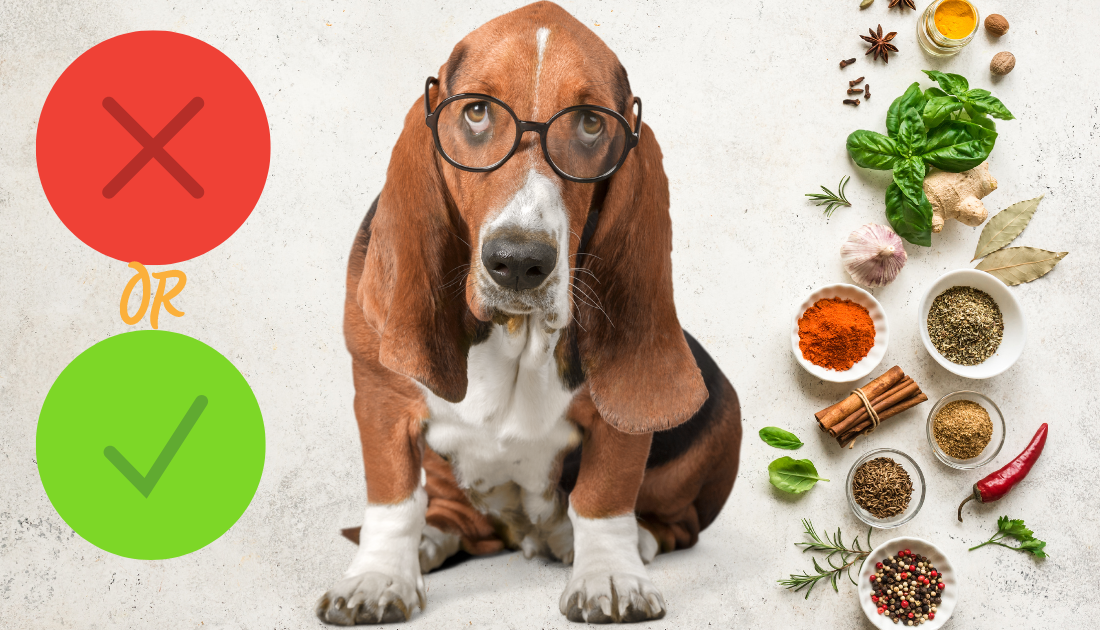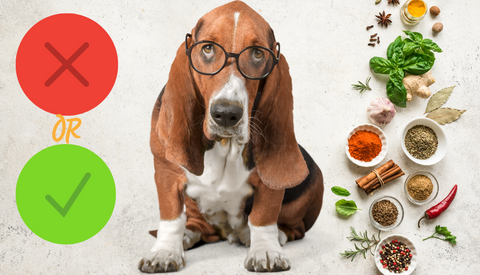Curry powder is not safe for dogs. It can cause stomach upset and other health issues.
Dogs have different digestive systems than humans. Ingredients in curry powder, such as garlic, onion, and certain spices, can be harmful. These components may lead to gastrointestinal distress, vomiting, and diarrhea in dogs. In severe cases, they can cause more serious health problems like anemia.
Always consult your vet before introducing new foods to your dog’s diet. Keeping toxic substances out of your dog’s reach is crucial for their well-being. Knowing what foods and spices are dangerous helps ensure your furry friend’s health and happiness. Avoid feeding your dog any dishes containing curry powder.

Introduction To Curry Powder And Canine Health
Curry powder is a popular spice blend in many kitchens. It adds flavor to dishes with its unique mix of spices. But is it safe for dogs? Let’s explore the relationship between curry powder and canine health.
What Is Curry Powder?
Curry powder is a mix of spices like turmeric, coriander, and cumin. These spices give it a rich, yellow color and a warm, complex flavor. Curry powder can vary in spice levels. Some blends are mild, while others are very hot.
Concerns For Dogs
Dogs have different digestive systems than humans. Some ingredients in curry powder can be harmful to dogs.
- Turmeric: While turmeric has anti-inflammatory properties, too much can upset a dog’s stomach.
- Onion and Garlic: Many curry powders contain onion and garlic. Both are toxic to dogs and can cause serious health problems.
- Spicy Ingredients: Spicy components can irritate a dog’s digestive tract, causing pain and discomfort.
It’s important to keep curry powder out of your dog’s reach. If your dog ingests curry powder, monitor them closely. Look for signs of distress like vomiting, diarrhea, or lethargy. Consult a vet immediately if you notice any symptoms.

Key Ingredients In Curry Powder
Curry powder is a popular spice blend in many kitchens. But is it safe for dogs? To answer that, let’s look at the key ingredients in curry powder.
Turmeric
Turmeric is a common ingredient in curry powder. It gives the spice its yellow color. Turmeric has anti-inflammatory properties and is safe in small amounts. Too much turmeric can upset your dog’s stomach. Always use turmeric sparingly.
Chili Peppers
Chili peppers add heat to curry powder. They contain a compound called capsaicin. Capsaicin can cause irritation and discomfort in dogs. Dogs are sensitive to spicy foods. Avoid giving your dog anything with chili peppers.
Other Spices
Curry powder contains other spices like cumin, coriander, and fenugreek. These spices are not toxic but can cause digestive issues. Too much spice can lead to diarrhea or vomiting. Always be cautious with spices around dogs.
| Ingredient | Effect on Dogs |
|---|---|
| Turmeric | Safe in small amounts |
| Chili Peppers | Can cause irritation |
| Other Spices | May cause digestive issues |
Understanding these ingredients helps keep your dog safe. Always check food labels before sharing with your dog.
Toxicity Of Common Spices To Dogs
Understanding the toxicity of common spices to dogs is crucial for pet owners. Many spices in our kitchens can be harmful to our furry friends. Let’s explore the dangers of some common spices.
Garlic And Onions
Garlic and onions are popular in many dishes, but they are toxic to dogs. These spices can damage your dog’s red blood cells, leading to anemia. Symptoms of toxicity include vomiting, weakness, and difficulty breathing.
- Garlic
- Onions
- Leeks
- Chives
Nutmeg
Nutmeg contains a compound called myristicin, which is dangerous for dogs. Ingesting nutmeg can cause hallucinations, increased heart rate, and seizures. Even a small amount can be harmful.
| Effect | Details |
|---|---|
| Hallucinations | Dogs may see or hear things that aren’t there. |
| Increased Heart Rate | Heart rate can rise dangerously high. |
| Seizures | Severe cases may lead to seizures. |
Salt And Other Spices
High amounts of salt can lead to sodium ion poisoning in dogs. Symptoms include vomiting, diarrhea, and tremors. Other spices like paprika, chili powder, and curry powder can also be harmful.
- Salt
- Paprika
- Chili Powder
- Curry Powder
Always keep these spices out of your dog’s reach. If your dog ingests any of these spices, contact your vet immediately.
Turmeric: A Double-edged Sword
Turmeric, a key ingredient in curry powder, offers various health benefits. Yet, it can pose risks to dogs if not handled correctly. Let’s explore its pros and cons.
Benefits For Dogs
Turmeric contains curcumin, a compound with medicinal properties. It can help dogs in many ways:
- Anti-Inflammatory: Reduces swelling and pain in joints.
- Antioxidant: Fights free radicals and boosts immunity.
- Digestive Aid: Improves gut health and reduces gas.
These benefits make turmeric a valuable addition to a dog’s diet. But remember, moderation is key.
Potential Risks
While turmeric has benefits, it also has potential risks. Too much turmeric can lead to:
- Gastrointestinal Issues: Causes stomach upset and diarrhea.
- Iron Absorption Problems: Hinders the body’s ability to absorb iron.
- Blood Thinning: Increases the risk of bleeding.
It is important to consult your vet before adding turmeric to your dog’s diet.
Below is a table summarizing the benefits and risks:
| Benefits | Risks |
|---|---|
| Anti-Inflammatory | Gastrointestinal Issues |
| Antioxidant | Iron Absorption Problems |
| Digestive Aid | Blood Thinning |
Considering both sides helps make an informed decision for your dog’s health.
Signs Of Spice Toxicity In Dogs
Dog owners often wonder if curry powder is toxic to dogs. The answer is yes, curry powder can be harmful. Dogs have sensitive systems. Spices in curry powder can cause various health issues.
Gastrointestinal Issues
Spice toxicity can lead to severe gastrointestinal problems in dogs. Common symptoms include:
- Vomiting: Your dog may vomit frequently after ingesting curry powder.
- Diarrhea: Watery stools can occur, leading to dehydration.
- Loss of Appetite: Dogs may refuse to eat due to stomach discomfort.
If these symptoms appear, seek veterinary help immediately.
Neurological Symptoms
Ingesting curry powder can also affect your dog’s nervous system. Watch out for these signs:
- Tremors: Your dog may experience muscle tremors or shakes.
- Seizures: Severe cases can lead to seizures, requiring urgent care.
- Disorientation: Dogs may seem confused or disoriented.
These symptoms require prompt medical attention to prevent further complications.
Immediate Actions If Your Dog Consumes Curry Powder
If your dog eats curry powder, act quickly. Curry powder can be harmful to dogs. Knowing what to do can make a big difference. Follow these steps to ensure your dog’s safety.
When To Call The Vet
Watch your dog closely after they eat curry powder. Look for signs of discomfort. Here are some symptoms that need a vet’s attention:
- Vomiting
- Diarrhea
- Excessive drooling
- Lethargy
- Seizures
If you see any of these signs, call your vet right away. It’s always better to be safe and get professional advice.
Home Care Tips
While waiting for the vet, you can do some things at home. These steps might help your dog feel better:
- Keep your dog calm: Avoid letting your dog run around. Rest can help.
- Offer water: Make sure your dog drinks water. This can flush out toxins.
- Monitor for changes: Watch for any new symptoms. Note down anything unusual.
Do not give your dog any human food or medication. Always check with your vet first.
Preventing Accidental Ingestion
Is curry powder toxic to dogs? Yes, it can be. Preventing accidental ingestion is crucial to keep your furry friend safe. In this section, we will discuss some essential tips and practices to ensure your dog does not accidentally consume curry powder.
Safe Storage Tips
- Store curry powder in a locked cabinet.
- Keep spices out of reach of pets.
- Use childproof locks for added safety.
- Label containers clearly to avoid confusion.
- Avoid storing spices on low shelves.
Dog-safe Food Practices
Ensure your dog only eats safe foods. Follow these practices:
- Feed your dog in a separate area.
- Do not allow dogs near the kitchen.
- Use dog-specific food bowls.
- Dispose of leftovers immediately.
- Teach your dog the “leave it” command.
By following these tips, you can prevent your dog from ingesting curry powder. Keeping your pet safe requires vigilance and good practices.

Alternatives To Curry Powder For Dogs
Is curry powder toxic to dogs? The answer is yes. Dogs should not eat curry powder because it contains harmful ingredients like garlic and onions. But don’t worry, there are many dog-safe spices and treats that your furry friend can enjoy. Let’s explore some great alternatives to curry powder for dogs.
Dog-safe Spices
There are many spices that are safe and healthy for dogs. Here are a few:
- Turmeric: This spice is great for dogs. It helps with inflammation and boosts the immune system.
- Cinnamon: Cinnamon is another safe spice. It can help regulate blood sugar levels.
- Ginger: Ginger is good for dogs. It helps with digestion and can ease nausea.
Making Dog-friendly Treats
You can make dog-friendly treats at home. Here is a simple recipe:
- Preheat your oven to 350°F (175°C).
- Mix 1 cup of pumpkin puree with 2 eggs in a bowl.
- Add 1/2 cup of oats and 1/2 cup of peanut butter (make sure it is xylitol-free).
- Stir in 1 teaspoon of turmeric and 1/2 teaspoon of cinnamon.
- Drop spoonfuls of the mixture onto a baking sheet.
- Bake for 15-20 minutes or until golden brown.
Your dog will love these treats, and they are safe and healthy!
Frequently Asked Questions
Is Curry Powder Safe For Dogs?
No, curry powder can harm dogs. It contains spices that are toxic to them.
What Happens If A Dog Eats Curry Powder?
Dogs may experience vomiting, diarrhea, and stomach pain. Consult your vet if your dog eats curry powder.
Can Small Amounts Of Curry Powder Hurt Dogs?
Yes, even small amounts can cause discomfort and digestive issues for dogs. Avoid feeding them curry powder.
Conclusion
Curry powder can be harmful to dogs due to certain ingredients. Always consult your vet before introducing new foods. Keep your dog safe by avoiding spices and sticking to their regular diet. Monitoring your pet’s health is crucial for a happy and healthy life.
Stay informed and protect your furry friend.

